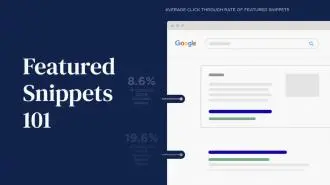Summary / TL;DR
The blog explains how Google's E-E-A-T framework—Experience, Expertise, Authoritativeness, and Trustworthiness—guides content quality evaluation to influence search rankings. Rather than operating as a direct algorithm, E-E-A-T helps Google assess whether content aligns with human quality standards, especially for ‘Your Money or Your Life’ (YMYL) topics. The updated guidelines focus on demonstrating first-hand experience, verified information, and professional credentials. Website creators can enhance rankings by improving factual accuracy, gaining authoritative backlinks, collecting positive reviews, and showing transparency through bios and contact details. While there is no numeric E-E-A-T score, quality raters use these principles to assess content, indirectly affecting algorithm training and ranking signals.
E-E-A-T is short for Experience, Expertise, Authoritativeness, and Trustworthiness. Google uses this acronym as a guideline to assess search quality. It plays a crucial role in determining how content is rated and ranked online.
Manual reviewers who assess the usefulness of web pages depend on search ranking systems like Google E-E-A-T. Google continuously trains its algorithms with machine learning, adjusting quality ratings as needed. These metrics are updated offline, and reviewers evaluate content quality against SEO community standards.
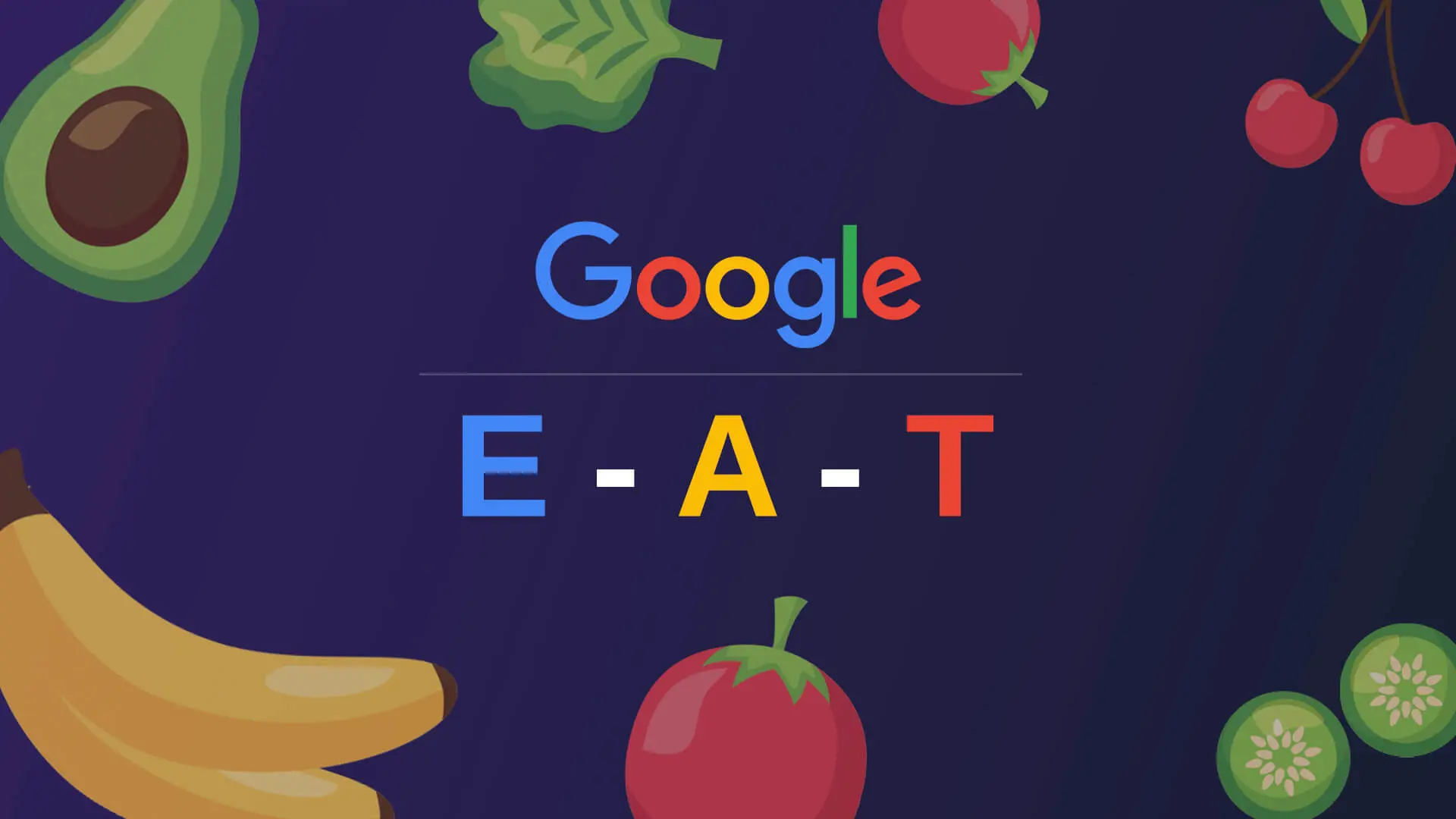
If a change is notable, it’s implemented, making significant information sources more visible. Remember, Google updates its core algorithm regularly, though most updates are minor. Keeping up with these can help you maintain your site’s visibility.
The guidelines illustrate how the inclusion of E for experience contributes to high-quality content, including the appropriate use of user-generated content.
These guidelines Google provides simplify modelling optimal Google Search results since the algorithm pushes these pages to the top. But, this is not the same as how Google ranks pages. High-quality content, underpinned by the concept of E (expertise), is ranked automatically, while Google’s search quality rater teams handle the manual review.
Here is an index of topics within the article for your convenience:
- What is E-E-A-T?
- What are E-E-A-T Updates?
- Impact of E-E-A-T on SERPs
- Search Quality Rater Guidelines
- What’s YMYL?
- How to Improve E-E-A-T Score?
- Characteristics Of High Quality And Low-Quality Pages
- Wrap Up
What is E-E-A-T?
Google aims to stop system manipulation. Rather than low-quality content, they shift emphasis to helpful content. This approach affects companies, brands, and skilled creators.
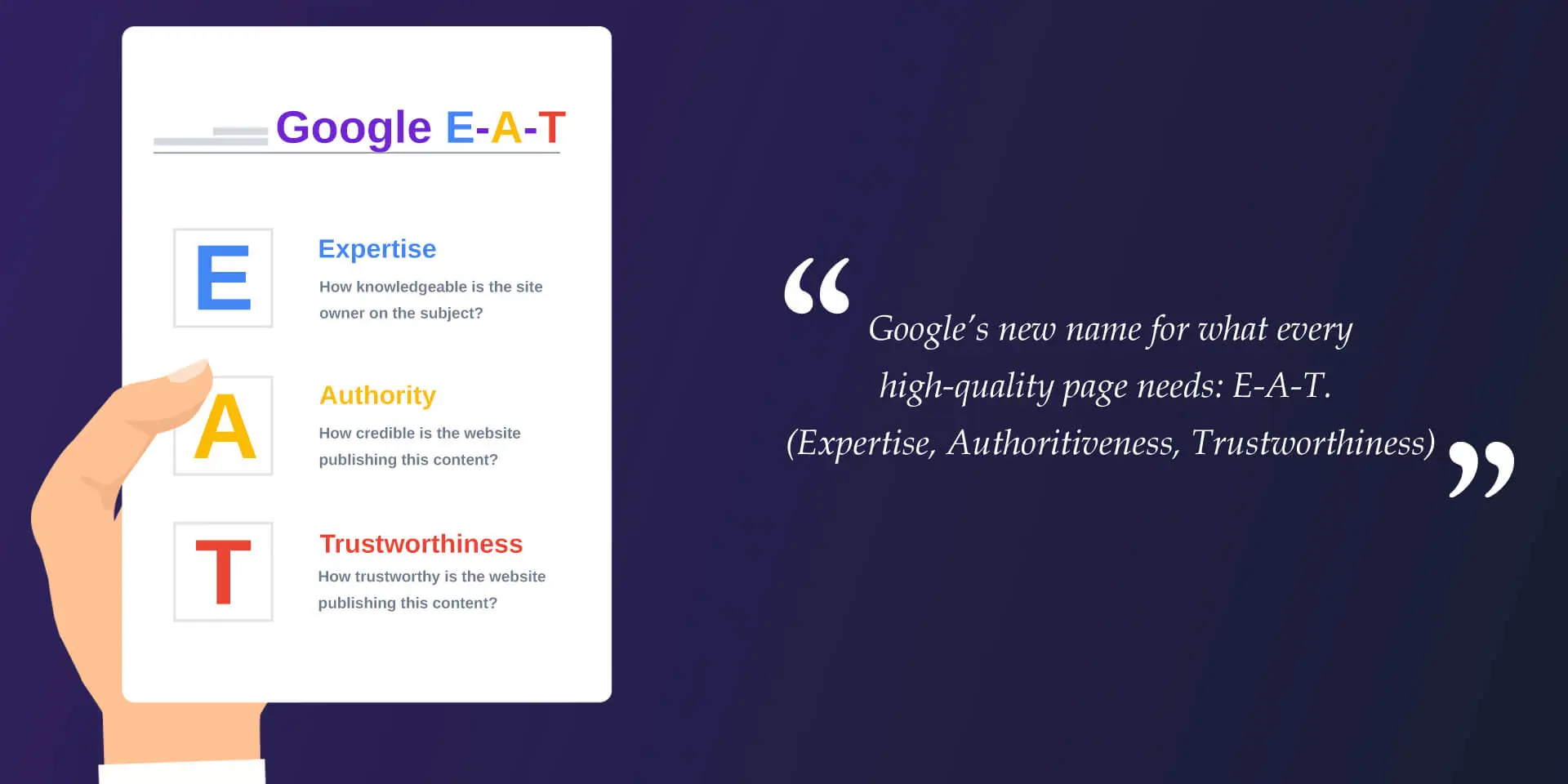
Google values web content that naturally integrates experience expertise, authoritativeness, and trustworthiness. Not only does it drive a nail in the coffin for those creating spam content, but E-E-A-T also rewards platforms whose content embodies the concept of “high-quality”.
Now, site owners can demonstrate their everyday expertise, authority, and trustworthiness by following these guidelines and building evidence of authority in their brand.
It helps Google rank the right web pages, and people get search results that answer search queries — showing what is expected for a search query. Though it constantly makes minor changes to Google’s search quality algorithm, E-E-A-T isn’t one single update.
Continuous refinement is used to demonstrate E in content where it’s perceived to be lacking, ensuring a steady page quality rating.
This particular ranking factor affects every site on the internet. Even companies redesign their pages to provide high-quality information.
Is E-E-A-T a ranking factor? Not if you mean there’s some technical thing like with speed that we can measure directly.
— Danny Sullivan (@dannysullivan) October 11, 2019
We do use a variety of signals as a proxy to tell if content seems to match E-E-A-T as humans would assess it.
In that regard, yeah, it’s a ranking factor.
This drive towards perfection is why Google’s E-E-A-T scale is so important.
Want to receive updates? Sign up to our newsletter
Each time a new blog is posted, you’ll receive a notification, it’s really that simple.
What are E-E-A-T Updates?
E-A-T first received mention in some observant blog articles around 2013. Google first mentioned YMYL pages in their guidebooks and Google News in March 2013; most SEO expertise sites missed this. When the 2014 version came out, Pages aligned more closely with E-E-A-T guidelines, focusing on trustworthiness and expertise.
In July 2018, Google released a new update where these guidelines went through another core update, focusing on creators’ beneficial purpose and reputation. Then, in August 2018, Google came out with the medic update, cementing the need for helpful content in their Search Quality Guidelines.
In 2023, Google introduced an extra E to the E-A-T acronym for “Experience”, making it E-E-A-T. This reflects Google requiring websites and creators to demonstrate substantial first-hand insights in their field before ranking highly. The change coincided with Google’s push for “helpful content” — prioritising pages that provide expertise-backed information to searchers.
With this update, Google essentially requires pages to showcase expertise, authority, longevity, history, and seasoned insights in their topic area to be considered authoritative resources. The E-E-A-T guideline, which stands for experience expertise, now rewards those showing tangible depth in their content’s subject matter.
What is E-E-A-T Score?
It introduces numerous interlinked concepts and algorithm changes that affect how Google ranks sites. There are some overlaps in the topics mentioned below.
“EAT and YMYL are concepts introduced for Quality Raters to dumb down algorithm concepts. They are not ‘scores’ used by Google internally.“ #Pubcon@methode Followup: There is no EAT algorithm.
— Grant Simmons (@simmonet) October 10, 2019
What is SEO Experience?
Experience refers to the practical knowledge and expertise gained over time spent actively working in a particular field or industry, which is integral to the content creation process.
Websites and content creators that can demonstrate substantial experience related to their topics inspire more confidence and trust from search engines and users. Signs of robust experience include many years in the field, sharing insights only seasoned professionals would know, examples showing the evolution of work over time, and a nuanced understanding of intricate details.
Google wants to feature pages that exhibit deep experience in their area of focus, making them reliable resources worthy of ranking highly. Therefore, content creators should highlight elements like longevity, career timelines, company history, case studies showing progress, and discussions of how approaches have adapted to industry changes.
The right amount of relevant experience qualifies websites and authors as experts in their topics.
What is SEO Expertise?
Organisations must understand how to achieve high E-E-A-T scores. Content marketers need to show expertise in their fields and steer clear of misinformation, intentional or not, to maintain integrity.
Unsubstantiated claims and AI generated content without relevant citations fall under the poor quality of content. Thus, people should avoid these.
Suppose the author is an expert on the topic. In that case, they should display credentials before writing, consider your traffic and search intent and create content Google wants to promote to that demographic. It doesn’t always have to be formal education. Real-life experience also counts when judging the ability of a content creator.
To create high quality content, the content should always answer the user’s questions while displaying a high level of E and tapping into what people demand.
What is SEO Authority?
Google assesses whether SEO industry insiders publish original research and regard certain websites highly. In that case, authors are also respected for their abilities and opinions.
Increasing authority on a topic can be achieved by ensuring that the main high-quality content on a web page provides relevant information to the site and aligns with the website’s purpose.
On-page SEO is as important as off-page SEO, which an author might achieve by creating backlinks. Typically, opinions should fit a broad consensus, or these topics must have a suitable backup if they go against the norm.
If an author is named or the person writing has appeared elsewhere, their content will likely rank well. Google’s search algorithm adds more trust to a site by including numerous citations from authoritative sources.
Organisations should ideally have associations with reputed publications, and if the author has their opinion cited elsewhere, it inspires a more significant amount of trust.
What is SEO Trust?
Google doesn’t want to send users to a site where they’ll get scammed. Hence, page quality rating is vital to search quality. There is a minimum read effort by Google to ensure that every one of its search results will provide authoritativeness, expertise, and trustworthiness to meet its users’ needs.
Establishing trust aids users in feeling secure, prompting them to welcome new content from the organisation. Content on About Us pages, including author bios or biographies, is essential in inspiring belief. Embedding a Google business profile with directions to the office premises is also an excellent move for sites because people know they’re dealing with an actual entity.
Information about customer service should clearly outline transactional processes, privacy and return policies. Thus, prospective clients know they have recourse.
It is also helpful to follow social media buttons since users can communicate with these organisations through social media platforms and provide feedback about the organisations they are following.
Apart from having HTTPS connections while making payments, companies can display gateway logos to assure people their money is safe.
Displaying reviews and ratings helps others understand how interactive their experiences have been. Similarly, if you have accolades and awards, you must mention them to show how much recognition you’ve received.
Add everything that reduces doubts and increases buyers’ trust in your website.
What is SEO Reputation?
Brand reputation, while not officially encapsulated within the expertise, authority, and trustworthiness acronym, is crucial for better Google search rankings. Google’s quality raters, as well as content creators, take this very seriously.
It goes beyond ordinary search quality to check mentions and reviews in other parts of the internet. Creators benefit from these quality rater guidelines.
If their works are positively mentioned elsewhere, the primary content strategy they’ve created for sites is favoured more by Google.
Impact of E-E-A-T on SERPs
E-E-A-T ensures expertise, authoritativeness, and trustworthiness in content and websites. Quality raters are instructed to suggest tweaks related to this algorithm. They sift through numerous sites and review them per Google’s quality rater guidelines.
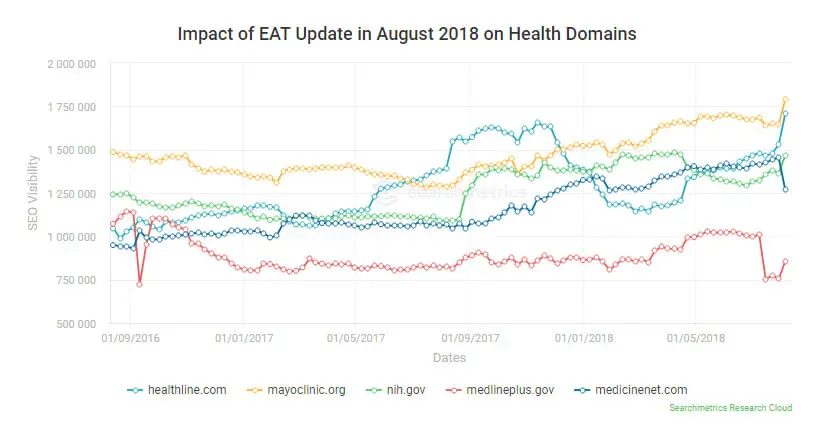
Image Credit: Search Metrics
Though they can’t directly influence how foremost content ranks, their reviews are cross-referenced with SERPs (search engine result pages), so vital information holds higher positions. Google makes numerous core updates based on this feedback. Special emphasis is directed to YMYL pages as part of Google’s search results prioritisation (your money or your life).
Search Quality Rater Guidelines
We’ve spoken about QRGs extensively, but here we go into the details of these guidelines. They’re intended to assist those with solid brand authority to review sites manually.
Feedback helps evaluate how effective Google’s algorithm is in measuring expertise authoritativeness and trustworthiness. It provides excellent insight into what SEO strategy decisions guide the performance of the Google Search engine algorithm. It confirms vital information and topics that Google considers essential for raters.
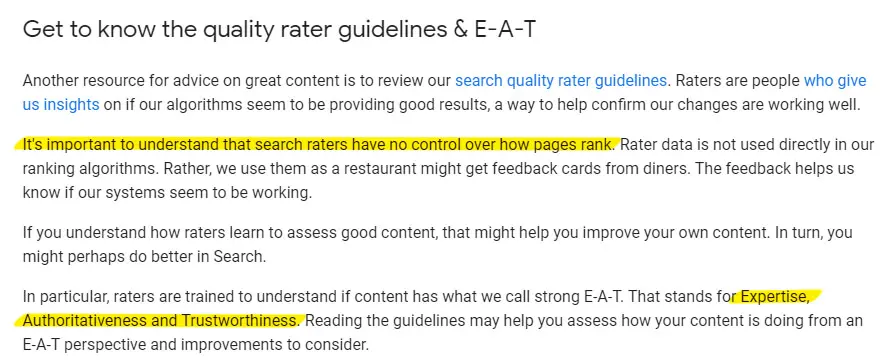
Pages are assessed by search quality raters and broken down into low, medium, high and highest qualities. Google tries to get high-quality content on pages to rank.
Raters have to consider different ranking factors, like the purpose of websites and the score of the content. They also factor in the amount and quality of content.
Information and reputation about the creator of this content also play an essential role. However, no system is perfect, and the guidelines sometimes don’t mention certain factors like keyword research that are essential influences on SEO.
What’s YMYL?
YMYL or Your Money Or Your Life refers to sites that can negatively impact users’ happiness, health, financial stability and safety if their expertise, authoritativeness, and trustworthiness aren’t up to the mark.
Typically, YMYL websites include a broad umbrella that has things like the following.
- Websites where money is exchanged hand through purchases, payments, and transfers.
- Any website with a medical update provides medical advice and information about illnesses.
- A website provides legal advice, like providing recourse, creating wills, and having custody information.
- A web page contributes to people’s knowledge, including blogs and newspapers.
- Any website provides financial advice for a useful purpose, either savings or investments.
However, this list isn’t exhaustive. You can get content about politics, vehicle safety, and vital information about schedules on the YMYL site.
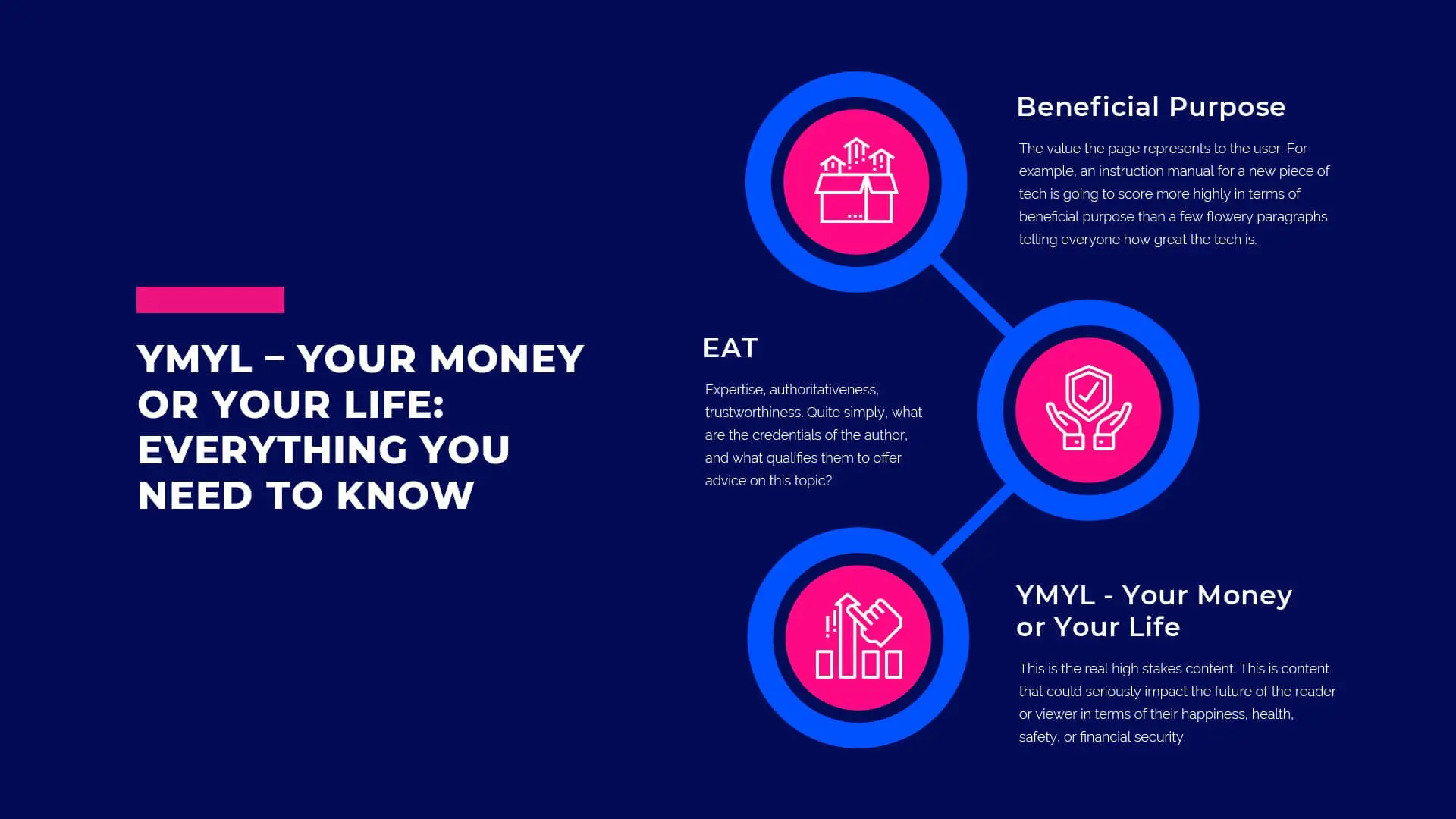
What are Trust Signals?
Since search engines can’t always verify if some information serves a valuable purpose, it looks at users and organisations who vouch for the truth in included topics.
Just as links from reputable websites establish you as a trustworthy source and improve the quality of information on your page, having your site mentioned by other trustworthy organisations for different topics, particularly ones that could increase Google’s faith.
How to Improve E-E-A-T Score?
There are several steps you can follow to boost E-E-A-T scores. A site can also demonstrate its score to Google better through these methods.
There are several resources online for doing this; however, you’ll find these helpful:
- E-E-A-T and SEO, from Marie Haynes
- Google Updates Quality Rater Guidelines Targeting E-E-A-T, Page Quality & Interstitials, from Jennifer Slegg
- Leveraging E-E-A-T for SEO Success, presentation from Lily Ray
- Google’s Core Algorithm Updates and The Power of User Studies: How Real Feedback From Real People Can Help Site Owners Surface Website Quality Problems (And More), Glenn Gabe
- Why E-E-A-T & Core Updates Will Change Your Content Approach, from Fajr Muhammad
1. Building More Links
Though Google’s guidelines don’t explicitly mention it, a site can improve E-E-A-T by increasing mentions and links on other authoritative domains.
Google says link-building understanding is crucial, as it greatly recognises which link backs count, so a page should prioritise better quality links over lower quality ones.
I asked Gary about E-E-A-T. He said it’s largely based on links and mentions on authoritative sites. i.e. if the Washington Post mentions you, that’s good.
— Marie Haynes (@Marie_Haynes) February 21, 2018
He recommended reading the sections in the QRG on E-E-A-T as it outlines things well. @methode#Pubcon
2. Update Content for Value
Updating content regularly for topics like medical or financial advice is especially important for YMYL to maintain an excellent E-E-A-T score due to the subject matter. Information must stem from authoritative sites and trusted sources and be verifiable at all times.
Writers should cover topics professionally and must be regularly edited, updated, and reviewed.
While QGRs don’t specifically discuss non-YMYL topics, it is still best to keep your page updated to ensure reader satisfaction.
3. Checking Facts
Google maintains that a page must have factually accurate content to get a high score. This becomes specifically relevant for scientific research.
Although there’s no clear pathway for fact-checking, you should match your page content against reputable sources like Wikipedia and Wikidata. Further, provide citations wherever necessary. Users prefer when YMYL topics have adequately verifiable sources.
Content lacking E in expertise benefits greatly from referencing authoritative sources to enhance its credibility.
4. Getting More Reviews
Online reviews significantly boost your page’s authority and trustworthiness. While some sites focus on specific platforms, it’s wise to pursue positive reviews everywhere. Aim for high rankings on industry-relevant pages users frequently visit.
5. Hiring Experts
All industries have experts, and it is best to hire them, especially if you cover YMYL topics. For non-YMYL concerns, it is not as important to hire experts. Instead, opt for those with outstanding track records or a reputation for creating great content. Being a well-known entity within your industry can make building your reputation easier and become a significant part of your content and traffic strategy.
You can use several options to hire an expert if you cannot do so. You can interview them or have them write guest posts for your blog.
6. Flashing Credentials
Whilst you’re demonstrating E-E-A-T to Google, it becomes necessary to brag. Include this information if you have degrees or have spoken at numerous conferences. You can do this in your website’s bio or the About Us section.
Some creators opt for a schema markup to present this information in a better manner as well.
7. Sharing Contact Details
Businesses must provide adequate contact information and customer support to avoid looking untrustworthy.
YMYL pages have to take special note of this. Google prefers a website showcasing email addresses, phone numbers, and many different contact points.
If you’re a solo blogger, these rules won’t apply to your website. But greater transparency creates more favour during a search.
8. Getting a Wikipedia Page
According to Google, getting a Wikipedia page is a sure way of proving your quality. Unfortunately, it is challenging for a website to get its own Wikipedia page. Usually, you’d have to be absolute experts in the area and enjoy coverage from numerous reputable sources.
Alternatively, you can try to get mentioned in a Wikipedia article. This helps with SEO, but it is difficult as well.
You can edit Wikipedia pages to include your organisation, but the website doesn’t support self-promotional content. However, take the shot if you’ve got something worth contributing.
9. Getting More Mentions
When users search for something, they put faith in a website with more mentions. Google takes note of this and ranks them higher, too.
Raters take this into account while assessing reputation. For example, getting mentioned in SEO journals shows expertise in that domain.
Since a degree of authority is first needed to get mentions, it is best to present unique data and insights for references. If you update the materials regularly, others will mention you for the latest topics.
Characteristics Of High Quality And Low-Quality Pages
A page that has been written well should display characteristics like great trustworthiness. The main content should come with helpful titles and should be informative.
For example, having a direction and a structured plan will help create top content quality when writing a blog post.
There must also be adequate information about the website. Users who search for it must be sure of its reputation.
Low-quality pages don’t display authoritative content and are marked down in assessments. The quality and quantity of the content created are poor, and there isn’t enough information about the site. If an extensive search turns up poor reviews, it is another nail in the coffin. Bad reviews, poor content quality, etc., can impact your overall rating.
Our thoughts on Google E-E-A-T
Following these guidelines is vital for your SEO sites to improve constantly. It is even more evident for YMYL topics.
You can hire experts, have values, and care about customers. Alternately, demonstrate values to Google.
Improving SEO is simple but needs some time and effort. Despite following all these steps, your search rankings may not increase.
It’s best not to be discouraged because Google will rightly rank sites with more authoritative pages or enjoy more reputation than you do.
While improving your expertise will surely give you an edge, you must constantly keep in touch with updates because the rules change frequently.



